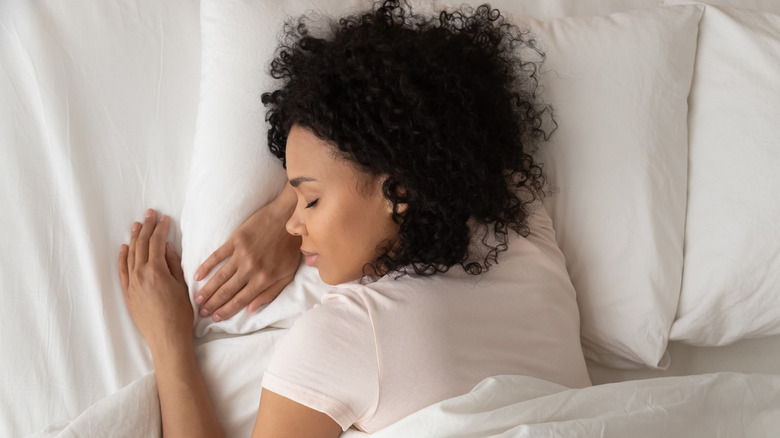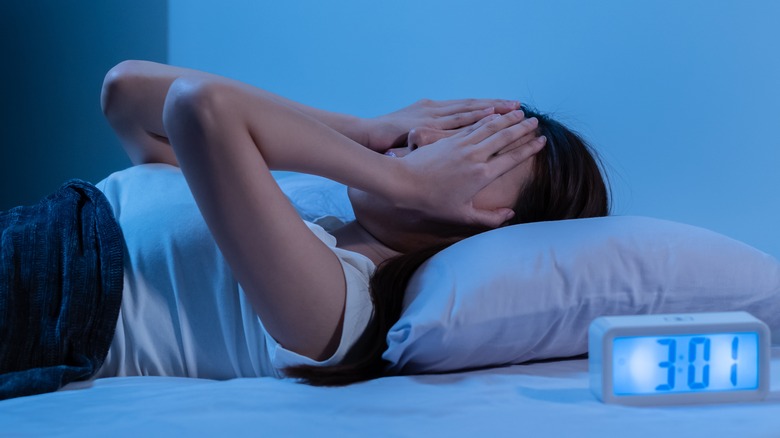Dreaming During A Nap Could Mean Your Sleep Cycle Is Off
Everyone loves a good nap. How great does it feel to close your eyes after lunch before getting lost on your screen again? Your head and eyes deserve a break. Plus, naps provide a plethora of health benefits. Naps can improve your memory, boost your mood, ease stress, enhance your creativity, are good for your heart, and much more. Basically, naps are naturally magical and you shouldn't feel guilty about laying your head down during the day.
SleepMD recommends napping around 1-2 p.m. if you wake up early or 2-3 p.m. if you're someone who stays up late. They also suggest aiming for 90 minutes — which is much longer than many people have to devote to an afternoon nap — to complete a full sleep cycle. If your alarm wakes you up before a full sleep cycle has been completed, chances are you'll feel a little moody and disoriented. It can also disrupt your precious nighttime sleep.
But, what do your dreams reveal about your health? Is dreaming during a nap a cause for concern?
Dreaming during a nap could be a warning sign
Dreams are a natural occurrence for many people when they snooze, but the truth is, dreaming while napping is a sign that you may be suffering from sleep deprivation. It may sound bizarre but you tend to dream more frequently when you have poor sleep habits.
A sign of sleep deprivation is having extremely realistic dreams during your slumber. If you're sleep deprived, you'll notice that when you do get a chance to lie down, you're out like a light when your head hits the pillow. Though you may feel as if everything is turned off, your brain actually turns on in this state of deep sleep and becomes the cause of your wacky dreams. This phenomenon is called REM rebound.
You've probably heard of REM sleep before. It's a type of sleep that happens in intervals throughout your sleep cycle. REM is an acronym for rapid eye movement, which is what happens when your eyelids are closed and your brain activity is sky-high while dreaming. According to Scientific American, during REM sleep your body is practically immobilized, besides a few twitches. REM rebound is a neurological and hormonal response that increases brain activity during sleep which makes the chances of having strange and outlandish dreams higher. It's as if your body is making up for all the dreams you didn't have the night or nights before.
How to fix your sleep cycle
Your sleep cycle can get wacky for many reasons such as sleeping in or starting a new medication. National Library of Medicine cites a review that found that the amount of REM sleep is reduced when taking antidepressants, especially ones that alter serotonin in the brain.
According to Winston-Salem Journal, it's estimated that 37 million Americans take an anti-depressant. The most common anti-depressant is selective serotonin reuptake inhibitors, or SSRIs, which target and increase serotonin levels. Besides medication, diet and lifestyle habits also have a big effect on your quality of sleep. A carb-filled plate can wreak havoc on your sleep. The same goes for if you smoke nicotine or drink alcohol.
Fixing your sleep schedule is great for your brain health and the overall health of your body. A good sleep schedule helps to boost your mood, keep you motivated, and of course, help you to remain sane. To fix your sleep cycle, it's vital to establish a routine where you wake at the same time every morning and go to bed at the same time every night. It's helpful to put your screens away an hour before you go to sleep. Individuals also benefit from reading before bed, meditating, or using lavender oil in a diffuser to create a calming environment. If you're making changes for better sleep and still having difficulties, it's best to talk to your doctor.


